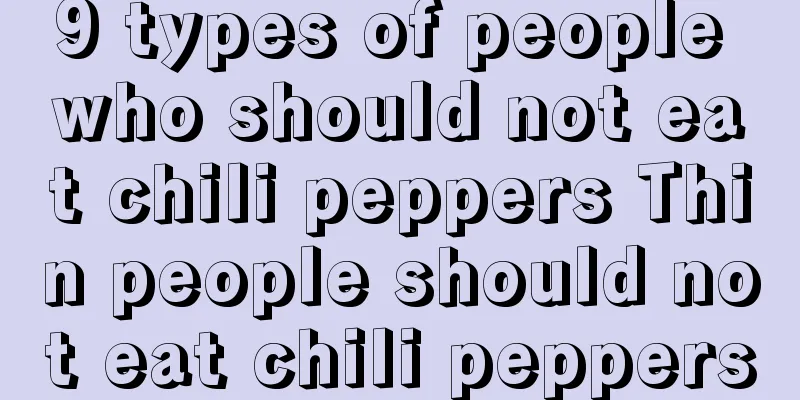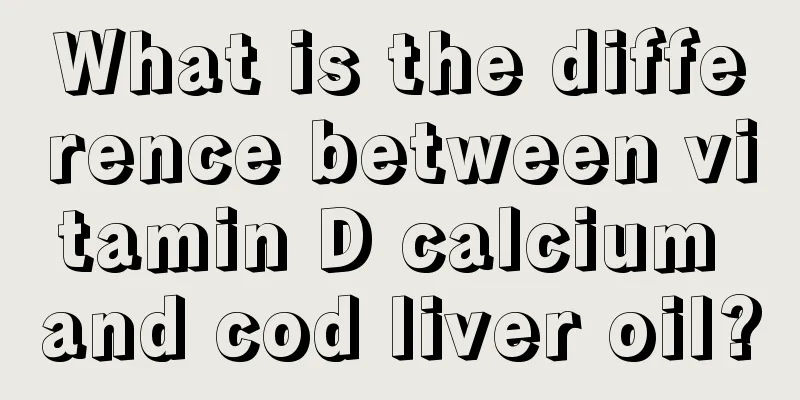9 types of people who should not eat chili peppers Thin people should not eat chili peppers

|
1. Patients with conjunctivitis and keratitis Xiao Li, 22 years old, is a Grade 10 student at a certain university. He returned to campus a few days ago and asked his classmates to have a midnight snack. Since they all like spicy food, they ordered all spicy dishes. Unexpectedly, the day before yesterday, Xiao Li's eyes felt hot and his eyelids were swollen. After going to the hospital for a check-up, he was diagnosed with conjunctivitis. After asking, the doctor said that his illness was related to his love for spicy food. Experts explain that hot spices such as peppers can cause the blood vessels in the eyes to dilate and become congested, leading to a decrease in the eye's resistance and making people more susceptible to conjunctivitis. In addition, spicy food should be avoided in summer and the diet should be light. Therefore, patients with symptoms such as conjunctivitis and keratitis should resolutely avoid eating chili peppers during the illness period. Because eating chili peppers can easily cause internal heat, which can aggravate the condition. 2. Patients with hemorrhoids Although peppers are rich in vitamin C, they can stimulate the taste buds and make people have an appetite in the hot summer. However, because peppers are very irritating, patients with hemorrhoids are prone to congestion and edema of the hemorrhoidal veins after eating peppers, which further aggravates the hemorrhoids and leads to the formation of anal abscesses. In addition, chili pepper can aggravate constipation and make hemorrhoids more severe. Therefore, patients with hemorrhoids should never eat chili peppers in summer. 3. People who take Chinese medicine Consuming capsaicin will affect the efficacy of traditional Chinese medicine, so spicy food should be avoided while taking traditional Chinese medicine. People who take Chinese medicine should have a lighter diet and avoid eating hot peppers and any food containing irritants, otherwise it will cause a relapse of the disease. 4. Patients with chronic cholecystitis, cholelithiasis, and pancreatitis Due to the stimulation of capsaicin, gastric acid secretion increases. Excessive gastric acid can cause gallbladder contraction and spasm of the sphincter of the bile duct, making it difficult for bile to be discharged, thereby inducing cholecystitis, biliary colic and pancreatitis. In addition, patients with such symptoms should eat more foods containing crude fiber and avoid irritating foods such as radishes, peppers, onions, etc. Otherwise, biliary colic may occur easily and the condition may become more serious. 5. Patients with cardiovascular and cerebrovascular diseases
6. Patients with kidney disease
Capsaicin is excreted through the kidneys and can damage renal parenchymal cells. In severe cases, it can cause changes in renal function or even renal failure. 7. Pregnant women
8. Hyperthyroidism patients
9. Thin people should not eat chili peppers
|
Recommend
Anterior mediastinal space-occupying lesion
The anterior mediastinal mass is a shadow seen on...
What are the preventive measures for rectal cancer
Rectal cancer is a common malignant tumor in the ...
Can eating coix seed cure plantar warts?
Plantar warts are a relatively common skin diseas...
How long is the best time to soak Tremella
It is better to soak the white fungus for three t...
Is lumbar radiofrequency surgery good?
Lumbar disease has affected and troubled many peo...
What medicine is good for occult blood
Urine occult blood can be said to be a relatively...
What are the methods and recipes for making homemade soap
Most people prefer to use handmade soap instead o...
The efficacy and function of Buddha's palm
Most people keep Buddha's palm as bonsai at h...
8 tips to eliminate stomach bloating
There are many reasons for abdominal bloating, wh...
What are the causes of acute and chronic glomerulonephritis?
In order to effectively prevent and treat the occ...
The most prominent symptom of laryngeal cancer is usually hoarseness
The most prominent symptom of laryngeal cancer is...
Why do I sweat easily?
Under normal circumstances, everyone will sweat, ...
Introducing the four major causes of brain cancer
The occurrence of brain cancer has seriously affe...
What should I do if my nose and mouth get blisters due to inflammation?
As people's living standards improve, their w...
Is ginger honey water useful for treating cough?
Cough is a common symptom of lung diseases. It ma...









